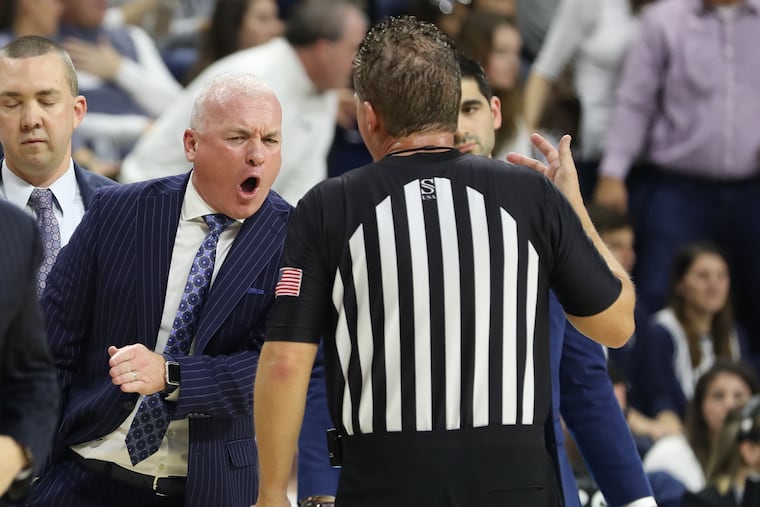Penn State basketball coach, Delco native Pat Chambers referenced a ‘noose’ around a Black player’s neck
Chambers apologized and the university vowed to do better. It is standing by the coach, a Newtown Square native.

Former Penn State basketball player Rasir Bolton revealed publicly Monday that head coach Patrick Chambers referenced a “noose” around Bolton’s neck during a conversation in January 2019.
“A noose, symbolic of lynching, defined as one of the most powerful symbols directed at African Americans invoking the history of lynching, slavery and racial terrorism,” Bolton wrote on Twitter. “Due to other interactions with Coach, I knew this was no slip of the tongue.”
At the time, neither Chambers nor the university seriously addressed Bolton’s concerns even after he reported the comments.
Bolton said that Chambers later told his player he was “really impressed with how well spoken and organized [his] parents were.” Bolton said that was “yet another subtle insult,” one Black people are used to hearing, and contributed to the decision by the guard from Petersburg, Va., to transfer to Iowa State after his freshman year in State College.
When Bolton shared his experience on Twitter and in an Undefeated article Monday morning, it quickly made national news. Bolton decided to tell his story now as the Black Lives Matter movement spreads across the world in response to the killing of George Floyd, an unarmed Black man, by a white Minneapolis police officer.
Chambers apologized and the university vowed to do better. The university is standing by the coach, a Newtown Square native who has helped improve the basketball team in part by recruiting star players from Philadelphia.
“I’ve realized the pain my words and ignorance caused Rasir Bolton and his family,” Chambers said in a statement. “I failed to comprehend the experiences of others, and the reference I made was hurtful, insensitive, and unacceptable. I cannot apologize enough for what I said, and I will carry that forever.”
Bolton said Chambers, who is known as a coach prone to outbursts, did not seem to comprehend the gravity of his words in 2019.
A day after Chambers served a one-game suspension for shoving a player in the chest during one of the season’s many losses, he approached Bolton as he worked out in an empty gym. Bolton told The Undefeated that Chambers said, “I want to be a stress reliever for you. You can talk to me about anything. I need to get some of this pressure off you.”
“I want to loosen the noose that’s around your neck,” Chambers added, according to Bolton.
Bolton said on Twitter that he immediately told his academic adviser, then confronted Chambers and spoke with the office of athletic director Sandy Barbour. His parents also contacted Barbour’s office and drove to State College for a meeting with Chambers and athletic administrators.
Penn State responded, Bolton said, by giving him the number for a psychologist, who told him of “ways to deal with Coach Chambers’ personality type.”
Chambers didn’t apologize, saying that he was “from the North and wasn’t aware” of the historical significance of a noose, Bolton said.
Bolton said his decision to speak out hurt his relationships with fellow players, some of whom were told he could now no longer be trusted and wasn’t “loyal” to the team.
Bolton decided to leave the program, he said, and Penn State never reached out to him about the incident.
After Bolton went public with his experience, Barbour released a list of steps Penn State’s athletic department would take to address systemic racism and ensure these situations are taken seriously.
“Patrick has stated he is committed to educating himself,” Barbour said in a statement, “and he is actively working to learn and grow, which will be imperative to his future success at Penn State.”
“Our Black community of students, faculty, and staff must have the opportunity to feel safe, respected, and welcome at Penn State,” she continued, “and clearly our past actions and words have not always contributed positively to that goal.”
Two 2019 starters, Lamar Stevens and Jamari Wheeler, came to Chambers’ defense.
Stevens wrote on Twitter: “He used a poor choice of words but Coach Chambers is a great man who made a mistake. His actions towards all of his current and past players speaks much more volume. Ask them …”
Wheeler said Chambers treated everyone on the team the same, regardless of race, and apologized repeatedly to the team for what he said to Bolton.
Bolton, however, indicated others may have had similar experiences. He told The Undefeated he wanted to help other Black college athletes, particularly those who aren’t starters and feel they can’t speak up about their coaches’ behavior out of fear of losing opportunities on the court.
“I wasn’t the first and I know I wasn’t the last,” he said. “There is a serious need for change in the way players are protected and helped across the country when faced with these situations. … In most cases, it is the coach who is protected, while the player is left to deal with it or leave.”